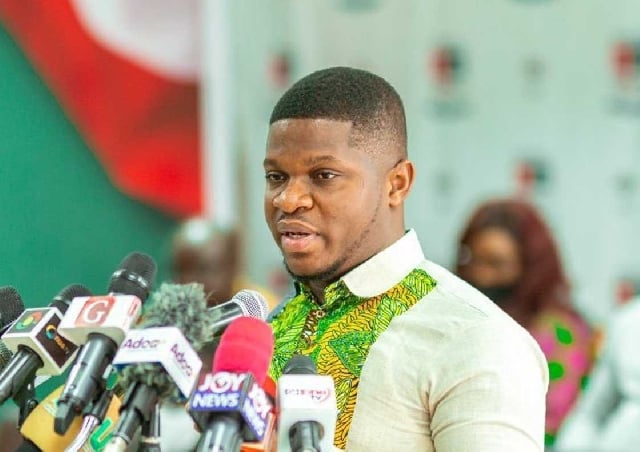In the lead-up to the 2024 presidential election in Ghana slated for December 7, the National Democratic Congress (NDC) National Communications Director, Sammy Gyamfi, expressed a strong belief that the election results will parallel those of the recent United States elections, in which former President Donald Trump was reelected. Gyamfi, in a Facebook post, alluded to the defeat of a sitting vice president who had been campaigning for change, likening it to a political scenario in Ghana involving experienced figures. He suggested that just as the U.S. election had resulted in surprising outcomes, Ghana’s political landscape may follow a similar trajectory, hinting at a potential victory for the NDC under the leadership of its flagbearer, John Dramani Mahama.
Further emphasizing his point, Gyamfi shared a collage of photos depicting Trump being prayed for by U.S. clergy alongside an image of Mahama receiving similar prayers from Ghanaian religious leaders. His posts reflect a strategic intertwining of local and international political narratives, showcasing how international events might be interpreted through the lens of Ghana’s political scenario. The implications of such comparisons could inform potential voters’ perceptions of their political landscape and the candidates involved, particularly around themes of divine favor and electoral success.
Moreover, Gyamfi referred to a prophetic prediction he received via a sermon, where a pastor spoke about a celebration by the NDC following an unspecified election on December 10, 2024. The pastor urged the NDC and its flagbearer to pray and remain hopeful, stating that light awaited them at the end of their political tunnel. The insistence on faith and spiritual assurance reflects the prominent role of religion in Ghanaian politics, where religious endorsements and prophecies can influence voter sentiment and mobilization efforts within parties, especially during election seasons.
John Dramani Mahama, the former president from the NDC, is returning to the electoral fray with the goal of revitalizing Ghana’s economic situation. His campaign slogan emphasizes a need to “reset” the country’s fortunes, signaling to the electorate a proposal for substantial economic reform under his leadership. The contrast with his main opponent, Mahamudu Bawumia of the ruling New Patriotic Party (NPP), highlights a deeper narrative around experience versus innovation, with Mahama framed as an established and dependable candidate compared to Bawumia, who is characterized by his aspirations for a progressive digital transformation of the economy.
Bawumia has branded himself with the metaphor of a “bus conductor,” which speaks to his self-perception as someone ready to take on greater responsibility from the “driver,” a role attributed to the current president. This playful yet poignant analogy sets the stage for a campaign focused on continuity of progress, pitched against Mahama’s seasoned leadership. As the political narratives unfold, each candidate’s strategy will likely hinge on their perceived ability to lead Ghana through its current economic challenges.
Overall, the dynamics between the NDC led by Mahama and the NPP represented by Bawumia will shape the electoral discourse as the polls approach. The intertwining of local aspirations with global political phenomena, combined with spiritual undertones bringing hope and stability to the NDC’s campaign, presents an intriguing electoral landscape. As Ghanaians prepare to vote, the expectations of change, experience, and the influence of religious belief will undoubtedly play significant roles in determining the upcoming election’s outcome.














